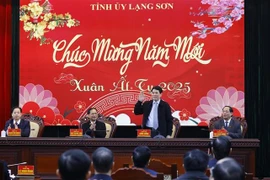Hanoi (VNA) – Party General Secretary To Lam has freshly penned an article on building an elite, streamlined, strong, efficient, valid and effective political system.
The article published on November 5 stressed that at every revolutionary stage, the Party and State have consistently placed importance on enhancing the leadership, governance, and combat capacity of the Party, and on strengthening the efficiency, validity, and effectiveness of the political system. This is one of the pivotal elements that have enabled the Communist Party of Vietnam (CPV) to become a great helmsman and a visionary captain skillfully steering the ship of the Vietnamese revolution through challenges to achieve victory after victory, the Party leader wrote.
According to him, the strategic convergence achieved following the four decades of the national renewal process (doi moi) presents a historic opportunity for Vietnam to enter a new era of development and national rise, while posing an urgent requirement for drastic implementation of a revolutionary to build a truly elite and streamlined political system that operates efficiently and effectively and meets the requirements and tasks of this new revolutionary phase.
According to the General Secretary, with the 100th founding anniversary of the Party and the 100th anniversary of the nation’s founding approaching, achieving strategic goals not only requires extraordinary efforts and exceptional commitment but also does not allow any delay, slackening, lack of precision, inconsistency and un-coordination in each step. To accomplish this, it is imperative to initiate a revolution in streamlining the organisational apparatus of the political system, with a focus on the following key tasks:
First, building and launching a comprehensive organisational model across the entire political system that meets the requirements and tasks in the new revolutionary phase. Focusing on reviewing the 7-year implementation of Resolution No. 18 titled “Several issues on continuing to innovate and rearrange the organisational apparatus for an elite, streamlined, effective and efficient political system”, adopted by the 6th plenum of the 12th Party Central Committee, making serious and comprehensive assessment of the situation, outcomes, strong points, weaknesses, limitations, obstacles, causes, and lessons learned during the implementation. Recommendations for innovation and rearrangement of the political system’s organisational apparatus should be proposed to the Politburo and the Party Central Committee.
The review must be conducted objectively, democratically, scientifically, specifically, profoundly, openly, and accurately in accordance with real-world conditions. From this foundation, a new organisational model should be proposed and its advantages and impacts evaluated upon implementation. The work must strictly adhere to the Constitution, Political Platform, Party Statute, Party principles, and Resolutions of the Party Central Committee, ensuring comprehensiveness, consistency, interconnection. One agency should perform multiple tasks; one task is assigned to only a single agency which bears responsibility for it; overlaps in functions and tasks as well as sectoral divisions must be eradicated; intermediary organisations should be limited; and functions, tasks, and specific responsibilities must be clearly defined based on Party principles, rationality and legality.
Secondly, it is necessary to focus on perfecting the institution in a spirit of both "running and queuing" so as to promptly translate the Party's policies into reality. Relevant legal regulations should be reviewed for amendments, supplementations or promulgations correctly by regulations, ensuring that the Party's policies are implemented as soon as they are approved by the Central Committee.
The Party chief also stressed the need to complete laws on the organisation and operation of agencies within the political system in association with the spirit of boosting the decentralisation and delegation of power following the motto of “localities deciding, localities implementing, and localities bearing the responsibilities”, with the Party, Government, and National Assembly strengthening the completion of the institutional framework, playing the assisting role, enhancing inspection, supervision, and maximising administrative reforms which includes reducing costs and creating the most favourable conditions for citizens and businesses. It is crucial to clarify the duties and powers of Government agencies, organisations, and individuals, ensuring a clear-cut distinction between the level responsible for issuing policies, orientations and laws and the level responsible for their implementation.
Thirdly, streamlining the organisational structure should be combined with restructuring the contingent of officials to ensure they possess the necessary quality, capacity, and qualifications for their tasks, with reasonable payroll and standardised job titles. It is necessary to issue regulations on the framework of standards and criteria for officials at all levels, from central to local, and across different types of organisations, so that proactive reviews can be conducted to identify immediate placements.
A strong reform of recruitment, training, promotion, appointment, rotation, transfer, and assessment of officials should be implemented in a substantive manner, focused on selecting the right people based on measurable outcomes, with no “forbidden” zones and no exceptions in the evaluation of officials.
There should also be effective mechanisms for filtering out those who lack the necessary quality, competence, or credibility, while promoting individuals with outstanding abilities, Lam wrote.
The Party chief concluded that building an effective and efficient apparatus is a difficult and complex task that requires solidarity, unity, courage, and the sacrifice of each official and Party member, as well as the high determination of the entire Party and political system, especially the heads of Party committees, authorities, the Vietnam Fatherland Front, and mass organisations at all levels, towards a prosperous, powerful, fair, democratic, and civilised Vietnam, which is soon able to stand shoulder to shoulder with the great powers of the world./.
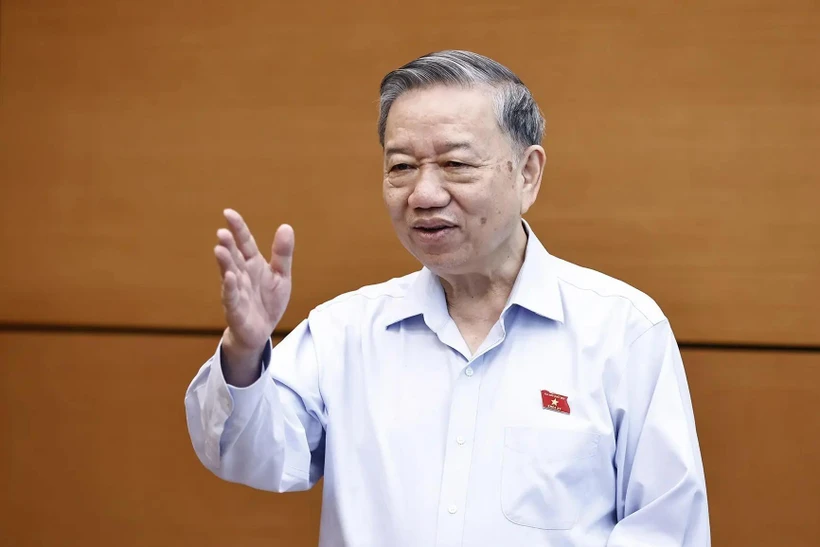
See more

☕ Afternoon briefing on February 5
The National Assembly (NA) Standing Committee convened its 42nd session in Hanoi on February 5 under the chair of NA Chairman Tran Thanh Man.
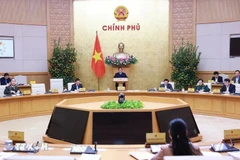
PM urges effective implementation of measures to spur socio-economic growth
Prime Minister Pham Minh Chinh stressed the need of active policy response, strengthened solidarity of the political system and the people, and drastic actions to realise all set targets.
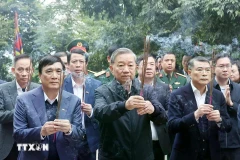
Party leader offers incense to commemorate Hung Kings
Party General Secretary To Lam and his entourage expressed deep respect and gratitude for Hung Kings, embodying the Vietnamese tradition of “when drinking water, remember its source.
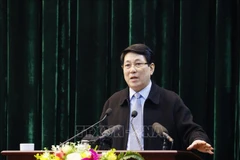
State President urges Lang Son to address obstacles to development
Noting that Lang Son needs to focus on thoroughly and deeply assessing its situation, opportunities, and challenges to determine the direction for development, Cuong emphasised the importance of bringing into full play the province's strengths, such as its border economy, sustainable tourism, and smart agriculture linked to export processing industries.
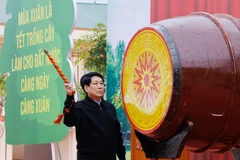
State President joins tree planting festival in Lang Son province
President Luong Cuong commended the local authorities, agencies, and organisations and localities nationwide in general for their achievements, as well as innovative, practical, and effective initiatives in implementing tree-planting movements and the 1-billion-tree growing project in recent years.
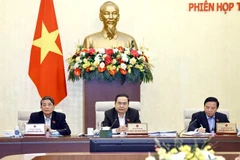
NA Standing Committee convenes 42nd session
The National Assembly (NA) Standing Committee convened its 42nd session in Hanoi on February 5, focusing on reviewing and providing feedback on draft laws and resolutions set for immediate issuance to facilitate the restructuring and streamlining of the government apparatus.

PM orders focus on key tasks to ensure fulfillment of socio-economic development goals
The Government leader asked for urgent, serious, synchronous and effective implementation of projects, tasks, and solutions outlined in resolutions and conclusions of the Party Central Committee, the National Assembly, and the Government, especially a supplementary plan for socio-economic development in 2025, aiming for a growth rate of at least 8%.
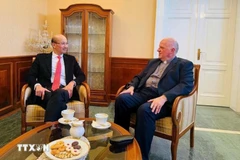
Vietnam ready to coordinate with diplomatic corps in Hungary
Vietnamese Ambassador to Hungary Bui Le Thai had a meeting with Apostolic Nuncio to Hungary Michael W. Banach, who is also Dean of the Diplomatic Corps in the European country, on February 4.
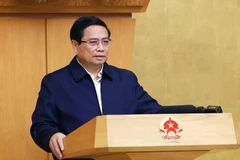
PM Pham Minh Chinh chairs Government’s monthly meeting
Stressing that all ministries and localities must achieve a minimum growth rate of 8% to lay the groundwork for double-digit growth in the coming years, PM Pham Minh Chinh requested the Government members to propose measures to stabilise the macroeconomy, curb inflation, promote growth, revitalise both traditional and emerging growth drivers.
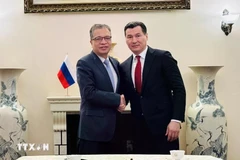
Vietnam, Kalmykia seek stronger cooperation
As this year’s annual World Buddhist Forum will be held in Kalmykia, and the Kalmyk leadership is eager to invite Vietnamese representatives, Ambassador Dang Minh Khoi emphasised that this will not only provide an excellent opportunity for exchange for Buddhists and scholars but also highlight shared cultural aspects such as traditional martial arts.

☀️ Morning digest on February 5
General Secretary of the Communist Party of Vietnam (CPV) Central Committee To Lam on February 4 held phone talks with First Secretary of the Communist Party of Cuba (CPC) Central Committee and President of Cuba Miguel Díaz-Canel.
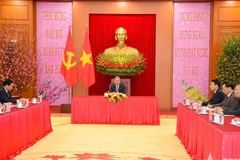
Top leaders of Vietnam, Cuba hold phone talks
On behalf of the Party, State, people of Cuba and General Raul Castro Ruz, Diaz-Canel conveyed the best wishes to the Party, State and people of Vietnam on the occasion of the 95th founding anniversary of the CPV (February 3, 1930 - 2025) and the Lunar New Year of the Snake.
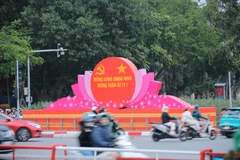
Vietnam’s victories under CPV’s leadership light up world’s national liberation movements
The achievements and victories that Vietnam has gained under the leadership of the Communist Party of Vietnam (CPV) light up national liberation movements worldwide, said General Secretary of the Communist Party of Sri Lanka Dr. G. Weerasinghe.
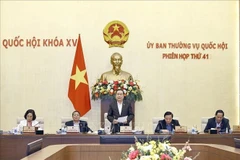
NA Standing Committee to convene 42nd session on February 5
The 42nd session of the National Assembly (NA) Standing Committee is set to take place over two and a half days, beginning on February 5.
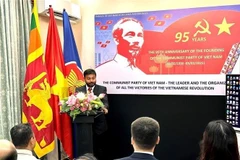
Political parties in Sri Lanka praise Vietnam's development achievements
Representatives from political parties in Sri Lanka have commended Vietnam's development achievements under the leadership of Communist Party of Vietnam.
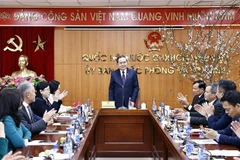
NA Chairman holds working sessions with key committees
National Assembly (NA) Chairman Tran Thanh Man held working sessions with several NA committees on February 4.
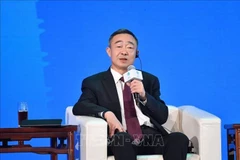
Nanning's cooperation with Vietnamese localities reaps fruits
Economic ties between Nanning and Vietnam have grown significantly. In 2024, bilateral trade reached 11.69 billion CNY (approximately 1.6 billion USD), accounting for 42.1% of its total trade with ASEAN member nations.
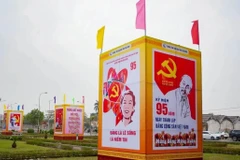
CPV – a source of inspiration for world’s revolution: Communist Party of Uruguay
The Communist Party of Uruguay (CPU) affirmed that the Communist Party of Vietnam (CPV)'s heroism and determination have inspired revolutionists across the globe.
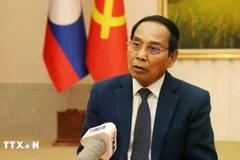
Streamlining Vietnam's apparatus a modernisation trend: Lao scholar
Under the leadership of the Communist Party of Vietnam, Vietnam has successfully achieved the goal of making it a strong country with prosperous people and a democratic and civilised society.

☕ Afternoon briefing on February 4
Party General Secretary To Lam on February 4 requested all agencies, units, and localities to immediately get to work after the Lunar New Year (Tet) holiday, with focus on completing the tasks on schedule for February and the first quarter of 2025.




